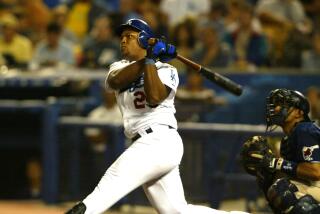After the Fall : Construction-Site Accident Ended Nez Balelo’s Chances of Making the Major Leagues, but Now He Has a Career in Baseball Instruction
Nez Balelo was on his way to the major leagues in 1987, a 23-year-old ballplayer only weeks away from reporting to spring training to compete for the job as the Seattle Mariners’ starting shortstop.
But, while working in construction during the off-season to make some extra money and stay in shape, he took one wrong step and dropped 38 feet down an elevator shaft onto the concrete below.
A plywood sheet, which was teetering over the opening to the elevator shaft, swung down like a trap door, dropping Balelo three floors.
“It was like one of those Disney films when people are falling into a tunnel,” he said. “You just keep going and going.”
When he finally hit, though, the trauma was severe.
His right thumb, which had been caught on a nail while he was falling through the shaft, was dangling by a strip of skin. His hips were twisted out of alignment. He had broken his back, his pelvis and his tailbone. He had fractured a rib and he had major head injuries.
“My lower half felt like someone had put a dagger in my spine,” Balelo said.
“When I tried to get up in the shaft and my body went numb, I knew at that point it would be a tough haul to get back in shape to play.”
Rather than becoming a major leaguer, as Balelo had anticipated, he played two mediocre minor league seasons and two more in Italy, then embarked on his current career. He owns and operates five successful baseball schools in Southern California.
Last spring, though, eight years after the accident he thought had ended his chances of playing in the majors, Balelo got another opportunity--as a replacement player with the Atlanta Braves.
When the player strike ended days before Balelo was to be the Braves’ starting shortstop in the replacement opener against the San Diego Padres, he could easily have figured it was merely another bad break.
But Balelo was born with his focus fixed squarely on the bright side, which his wife, Lisa, found out when she hurried to the hospital that fateful day and found her husband lying on a gurney, his body broken, scratched and bloody, but his attitude unchanged.
“He looked up at me and smiled,” she said. “And he said everything is going to be OK.”
Had Lisa not been so relieved her husband was alive, she might have been angry at him for working construction in the first place, risking his promising career.
Balelo, now 32 and living in Agoura Hills, was once a slick-fielding shortstop at University High in San Diego. He played two years at San Diego City College and then turned down offers from Arizona State and Miami to play at Pepperdine.
In his senior year there, Balelo was an All-West Coast Conference selection and set a school record for assists in a season.
Balelo had been drafted four previous times but finally signed after the Mariners picked him in the fourth round of the June draft in 1985.
He made his way through the low minors, and when the Mariners traded shortstop Spike Owen to the Boston Red Sox in August of 1986, Balelo figured he would get a shot at a major league job in spring training.
Even so, Balelo spent that off-season in Southern California working for a construction company to supplement his income and for the conditioning.
He had been working on various sites for about two months, never considering that it might not be the safest way for a professional athlete to be earning a dollar. Balelo had clauses in his baseball contract prohibiting him from skiing, motorcycle riding and other activities, but nothing about standing on top of a building pounding nails.
Lisa, though, was aware of the risks.
“I wasn’t happy about him working construction, but I wouldn’t let him know that,” she said. “And minor league salaries are so low that you have to.”
One morning in February, Lisa did make a point of telling Nez to be careful as he left for work. She says it was the only day she ever said it.
Balelo went to Santa Monica, where he was on a new site for the first time, and Lisa went to work at a real estate office in Malibu. About 10 that morning, she got a phone call.
“This is the UCLA medical center,” the voice on the phone said. “Your husband has been in an accident.”
Considering his fall, Balelo was lucky to be alive. He was also lucky that his injuries healed without surgery. He spent 17 days in the hospital, six of them in traction, as his body slowly began to put itself back together.
Within three weeks of the accident, Balelo was in a swimming pool, gingerly moving his battered body in a rehabilitation program. After five weeks, he was able to report to spring training on crutches. By the start of the season, Balelo was walking, slowly.
Balelo finally made it into a uniform late in the 1987 season, when he played for Chattanooga in the double-A Southern League. He played in 47 games and batted .193. The Mariners sent him back to double-A in 1988, and he continued to struggle, batting .214 and wearing down quickly under the pressure of a full season.
“My body just started falling apart,” he said. “I couldn’t play every day. I couldn’t do my rehab. I just didn’t have it anymore.”
By 1989, it was clear to Balelo that he was no longer in the Mariners’ plans. That spring, a friend contacted him about the possibility of playing in Italy. Balelo packed and went with his wife to play for Novara, in Northern Italy.
Italian baseball suited Balelo perfectly, because the teams played only three times a week. And playing against competition Balelo compared to Class A in the United States, he also tasted some success.
“I started getting my strength back,” he said. “I started to figure out ways to deal with [my limitations]. I started becoming a smarter ballplayer. Instead of relying on my talent, I started to rely on my mind. I figured the game out.”
Balelo had figured out the game so well after two years in Italy, he decided to start teaching it, turning down offers to sign minor league contracts in the United States and buying a baseball school in Agoura Hills.
“At this point, I had been so beaten up,” he said. “I had gotten up, got knocked down and gotten back up. I decided I needed to secure something in my life.”
When Balelo bought the West Coast Baseball School, it had one batting cage and two pitching mounds. A couple of hundred students a year came through.
Since Balelo took over, it has expanded to five cages, and that’s only in Agoura Hills. There are also branches in Burbank, Granada Hills, Santa Barbara and Saugus. Balelo has a staff of 22 instructors. His pupils--more than 5,000 of them a year--range in age from 6 to adult, and include several minor leaguers who began working with Balelo in high school.
With such a thriving business, Balelo was hesitant when the Braves called last winter, asking if he was willing to be a replacement player. His staff assured him it could take care of the schools while Balelo was away, so off he went.
The most beneficial part of spring training for Balelo was studying the Braves’ coaching staff, gleaning techniques he could take back to his schools.
“What I learned from these guys was unbelievable,” he said. “I really picked their brains.”
Still, Balelo was impressive enough on the field that he beat out three other shortstops and would have started for the Braves had the strike not ended two days before the team’s scheduled opener. Balelo said he was not upset when the major league carrot disappeared again. “I was happy because I have a ton of friends that play in the big leagues and I was glad to see they had their jobs back,” he said. “I have a job. I have a career.”
Of course, it could have been a much different career had Balelo picked some other way to stay in shape eight years ago.
“It was like a workout,” he said of his construction career. “But it didn’t really . . . work out.”
More to Read
Go beyond the scoreboard
Get the latest on L.A.'s teams in the daily Sports Report newsletter.
You may occasionally receive promotional content from the Los Angeles Times.










